实用阶梯英语翻译教程第二版 (1)
- 格式:ppt
- 大小:4.30 MB
- 文档页数:96
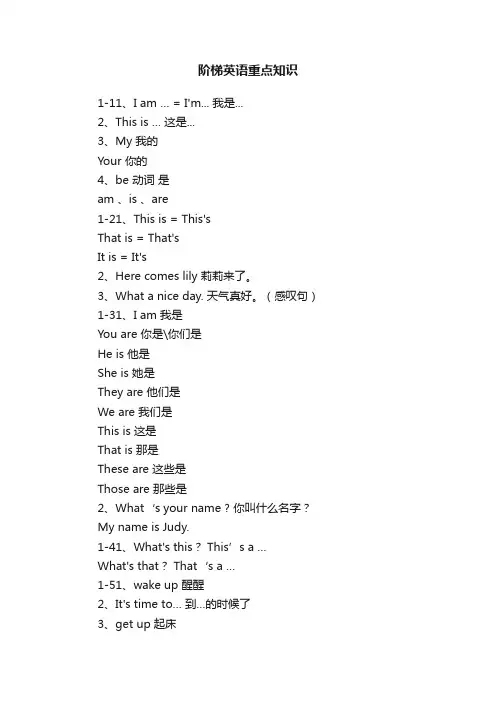
阶梯英语重点知识1-11、I am … = I'm... 我是...2、This is … 这是...3、My 我的Your 你的4、be 动词是am 、is 、are1-21、This is = This'sThat is = That'sIt is = It's2、Here comes lily 莉莉来了。
3、What a nice day. 天气真好。
(感叹句)1-31、I am 我是You are 你是\你们是He is 他是She is 她是They are 他们是We are 我们是This is 这是That is 那是These are 这些是Those are 那些是2、What‘s your name ? 你叫什么名字?My name is Judy.1-41、What's this?This’s a …What's that?That‘s a …1-51、wake up 醒醒2、It's time to… 到…的时候了3、get up 起床4、beautiful 美丽的5、复习 am 、is、are2-11、I have … 我有…We have … 我们有…2、one book 单数two books 复数3、so 所以now 现在4、new 新的 ---- old 旧的5、There are ... 有一些…东西2-21、I like … 我喜欢…2、And 和、然后、而且3、I'm cold 我冷I'm hungry 我饿I'm thirsty 我渴了4、Please 请Close the window,plesas. 5、疑问句Are you ok?你好吗?2-31、认知How are you?2、new 新的 old 旧的3、What‘s this?This is…4、WHat‘s that?That is…5、I’m coming.2-41、What's a …?好…一个2、big 大的 ---- small 小的3、There be 句型There isThere are4、I'm thirstyI'm hungry5、How about…?2-51、… is coming 谁来了I am coming. 我来了…and… are coming 谁和谁来了2、The sun is shining 今天阳光真好3、It‘s 是 It is 的缩写4、hot 热3-11、Where is …?…在哪?(单数)Where are …?…在哪?(复数)2、behind 在后面here 这里We are here 我们在这里You are here 你们在这里3-21、they 他们 their 他们的we 我们 our 我们的2、They're We're You're3、dear 亲爱的 love 爱pleasant 快乐的 have 有4、You're our dear daughter and son。

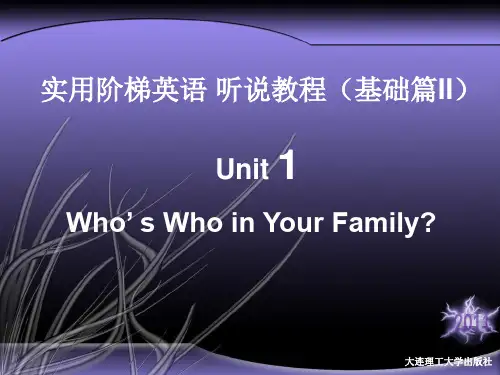
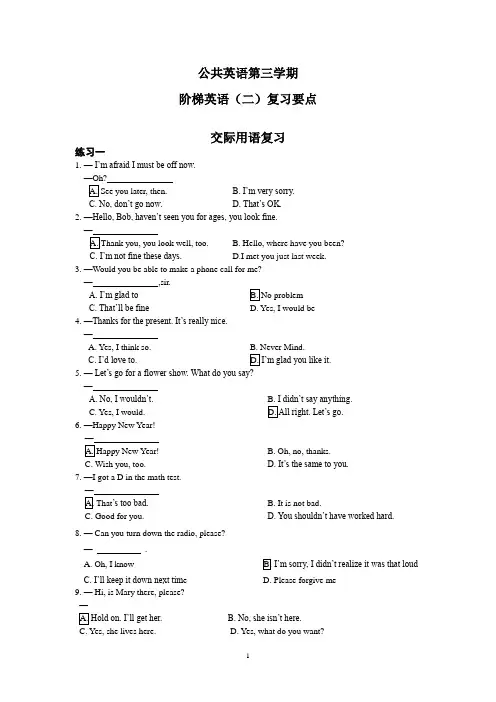
公共英语第三学期阶梯英语(二)复习要点交际用语复习练习一1. —I’m afraid I must be off now.—Oh?B. I’m very sorry.C. No, don’t go now.D. That’s OK.2. —Hello, Bob, haven’t seen you for ages, you look fine.—B. Hello, where have you been?C. I’m not fine these days.D.I met you just last week.3. —Would you be able to make a phone call for me?—,sir.A. I’m glad toC. That’ll be fineD. Yes, I would be4. —Thanks for the present. It’s really nice.—A. Yes, I think so.B. Never Mind.C. I’d love to.5. —Let’s go for a flower show. What do you say?—A. No, I wouldn’t.B. I didn’t say anything.C. Yes, I would.6. —Happy New Year!—B. Oh, no, thanks.C. Wish you, too.D. It’s the same to you.7. —I got a D in the math test.—’s too bad. B. It is not bad.C. Good for you.D. You shouldn’t have worked hard.8. — Can you turn down the radio, please?—.A. Oh, I knowC. I’ll keep it down next tim eD. Please forgive me9. — Hi, is Mary there, please?—_________B. No, she isn’t here.C. Yes, she lives here.D. Yes, what do you want?10.—Doctor, I don’t feel well.—_________A. You are f ine.B. It doesn’t matter.D. Don’t take it seriously.11. — Let me help you with your luggage.—A. Yes, please.B. I know you’ll help me.D. Yes, of course.12. ——I want to buy two 50fenstamps.B. What do you want to buy?C. Do you want to buy stamps or envelopes?D. What are you looking for?13. —Can you win the match?—A. I’m sure you will.I’m afraid not.C. No one knows.D. I don’t hope so.14. —I’m sorry I can’t follow you. Would you mind saying that slowly?—B. No, I wouldn’t.C. I’ve no idea.D. No, I would.15. ——I’ve just asked where you are from.B. Repeat.C. Excuse me!D. What’s wrong?答案:1.A。
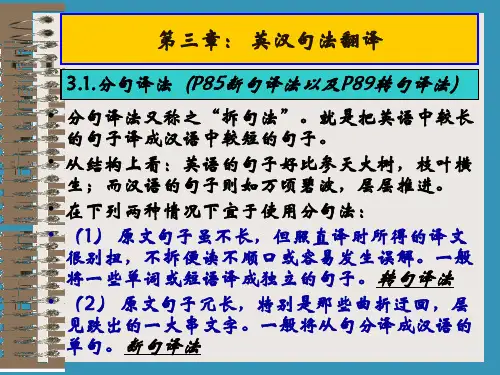

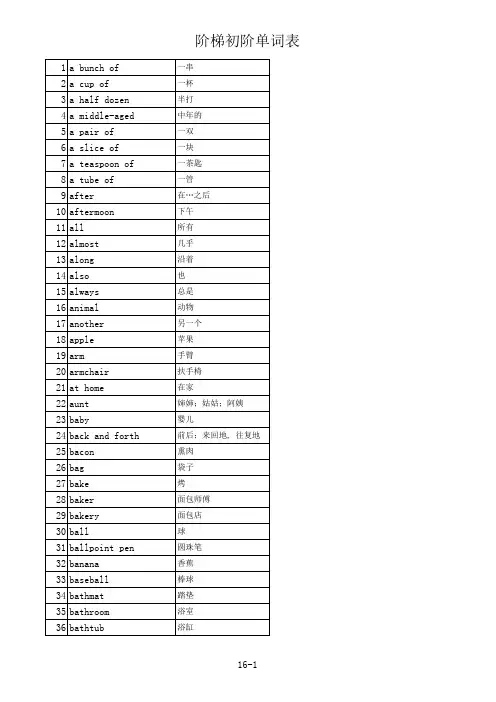
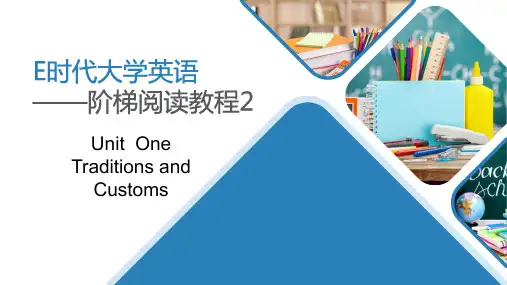
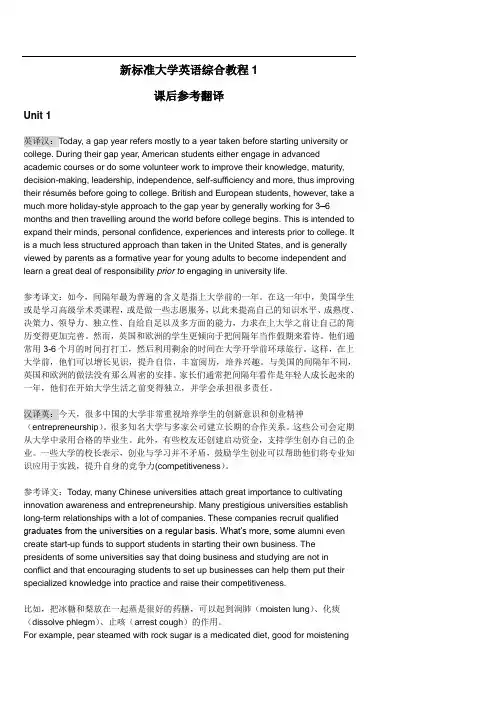
新标准大学英语综合教程1课后参考翻译Unit 1英译汉:T oday, a gap year refers mostly to a year taken before starting university or college. During their gap year, American students either engage in advanced academic courses or do some volunteer work to improve their knowledge, maturity, decision-making, leadership, independence, self-sufficiency and more, thus improving their résumés before going to college. British and European students, however, take a much more holiday-style approach to the gap year by generally working for 3–6 months and then travelling around the world before college begins. This is intended to expand their minds, personal confidence, experiences and interests prior to college. It is a much less structured approach than taken in the United States, and is generally viewed by parents as a formative year for young adults to become independent and learn a great deal of responsibility prior to engaging in university life.参考译文:如今,间隔年最为普遍的含义是指上大学前的一年。
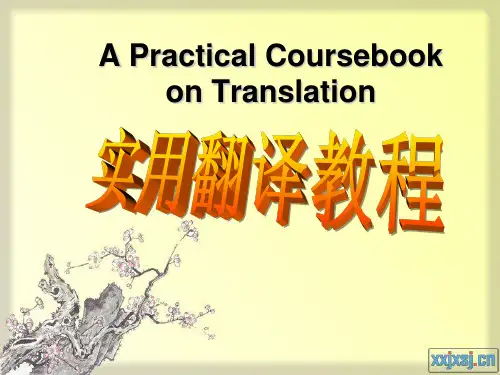

Unit 1 EducationObjectives1.Read what Bill Gates says about education;2.Build up your vocabulary relating to campus life;3.Learn something from an ancient Greek educator;4.Study different types of nouns;5.Write an introduction of yourself.Focuses1.Build up your vocabulary relating to campus life;2.Write an introduction of yourself.Outline1.Warm-up Discussion; study of words and expressions in Text A; Vocabulary Check (B and C)2.Discussion of Text A and the follow-up exercises (A and B)3.Active Words and V ocabulary Check; Grammar Tips4.Discussion of Text B and the follow-up exercisesprehensive Exercises (Ask the students to do the translation exercises outside of theclass beforehand)6.Practical WritingProcedures:Classroom ActivitiesI. Warm-up discussionQuestion: Do you know anything about Bill Gates such as his life and his educational background?Hint1)birthday and birthplace: October 28, 1995; Seattle, Washington2)educational background: Harvard University (education not completed)3)career: chairmen and chief software architect of Microsoft, the word’s largest and most profitable software company.4)main events in his life:a.beginning programming computers at age 13;b.developing a version of the programming language BASIC for the first microcomputer in Harvard;c.founding Microsoft Corporation in 1975 at the age of 19II. Vocabulary in Text A1. education n.教育e.g. Children in poor areas receive free education.educate v.教育;教导educated adj.受教育的e.g. a well-educated maneducator n.教育家,教育者2. count v.派用场,点数e.g. 1) Every seconds counts.2) What counts more is whether you have tried your best.3) to count from 1 to 1004) Count these apples.3. advantage n.有利条件,好处;优点,优势e.g. This product has many advantages.advantageous adj.有利的,有益的,便利的e.g. It is highly advantageous to us.Phrase: take advantage of 很好的使用;利用e.g. take advantage of all educational opportunitiesAntonym: disadvantage n.不利;不利条件e.g. His bad health is a great disadvantage to him when he looks for work.4. lifetime n.一生,终生e.g. 1) a lifetime guarantee2)lifetime membership3) In my father’s lifetime there have been many changes in the village.5. part-time adj.& adv.兼职的(地)e.g. 1)a part-time job2)He works part-time.full-time adj.全职的e.g. a full-time housewife6. programmer n.程序师,编程员program v.编制程序e.g. Please program the computer to do the job instead of doing it manually(手工操作).7. discourage vt. 不鼓励;使泄气,使失去信心e.g. His parents discouraged him from joining the air force.discouraged adj. 泄气的,失去信心的discouraging adj.使人泄气的,使人失去信心的e.g. 1) If you meet difficulty in your study, don’t be discouraged.2) It is discouraging that I didn’t know how to solve the problem.Antonym: encourage vt.鼓励e.g. I encouraged her to work hard and to try to pass the examinations.courage n. 勇敢,勇气e.g. David showed great courage when he saved the child from the burning house.8. diploma n. 文凭,毕业证书e.g. a college diplomadiplomatic adj. 外交的,从事外交的e.g. Julia joined the diplomatic service after her graduation from university.9. project n.项目,课题e.g. 1) an impossible project2) The professor is directing a research project.Synonym: plan10. highly adv. 高度地;非常e.g. 1) a highly interesting story2) a highly paid jobPhrase: speak/ think highly of 赞扬,对…给予很高评价e.g. The leader speaks / thinks highly of our work.11. focus v.(使)集中;(使)聚焦e.g. 1) to focus (one’s mind) in work2) All eyes focused on the speaker.focus n.(兴趣活动等的)中心,焦点e.g. Because of his strange clothes, he immediately became the focus of attention when heentered the office.12. range n. 范围e.g. You have a wide range of choices.range vi.在某范围内变化e.g. The temperature ranges from 10 to 20 degrees.13. attend v.参加,出席e.g. attend schoolattend a lectureattendance n.出席,到场14. automatically adv.自动地e.g. the machine operates automatically.automatic adj.自动的e.g. We have an automatic washing machine.15. drop out of 退学,不参与,退出e.g. 1) He dropped out of school at the age of 10 because his family was too poor to afford thetuition.2) She decided to drop out of the competition because it was not fire.16. chance of a lifetime 千载难逢的良机,一生中唯一的机会e.g. It’s the chance of a lifetime. You will regret it the rest of your life if you don’t take it.17. try out 试验,考验e.g. She bought a cookbook and tried out a few new recipes.18. in short 简而言之,总之e.g. In short, you should study hard for a better future.Synonym: in brief/ to sum up/ all in all/ in conclusionIII. Language Points in Text A1.They want to know what to study, or whether it’s Ok to drop out of college since that’s what I did.what to study: This is a wh-word + infinitive structure used as the object, which can be changed into an object clause. Wh-word + infinitive structure can be used as a subject, an object, or an appositive clause(同位语从句),for example:1)How to improve their English is often discussed among the students.2)We haven’t decided when to visit the place.3)You haven’t answered my question about where to get these books.it’s Ok to drop out of college: Here “it” is used as a formal subject, and the actual subject is the infinitive structure “to drop out of college”. The general pattern is “It is + adj. + (for/ of + sb.) to do sth.” More examples:1)It was very thoughtful of her to come to see me when I was ill.2)It’s easy for me to see through his trick.that’s what I did: “what I did” here is a predictive clause (表语从句)introduced by “what”. It is always structured in the form of “subject + be/ look/ remain/ seem + predictive clause” and can be introduced by such words as “that” (always omitted), and other wh-words, for example:1) It seems (that) it is going to rain.2) This is why I refused to attend the meeting.2. As I’ve said before, nobody should drop out of college unless they believe they face the chance of a lifetime.As I’ve said before: This is a non-restrictive relative clause(非限制性关系从句) introduced by “as”(正如…的那样), which can be placed at the beginning or at the end of the sentence. More examples:1) As people expected, she was admitted to Beijing University.2) Hundreds of people were killed in the earthquake, as I have learned from the newspaper. unless: is a conjunction for an adverbial clause of condition (条件状语从句), which equals “if…not…”(除非).e.g. I won’t leave unless the rain stops.3. In my company’s early years, we have a bright part-time programmer who planned to drop out of high school to work.planned to: intend to do sth.计划、打算做某事e.g. I plan to make a trip to Beijing during the summer vocation.who planned to …work: a restrictive relative clause introduced by “who” since its antecedent is a person and serves as the subject in the clause. The relative pronoun “that” can be used here too. More examples:1) The young man who sits there quietly is my brother.2) I don’t like people that pry into others’ private business.4. Having a diploma certainly helps somebody who is looking to us for a job.look to sb./ sth.: to depend on sb. or sth. for help or advice 指望,依赖e.g. We look to you for support.5. High school and college offer you the best chance to learn many things and to do projects with others that teach you about team spirit.that teach you about team spirit: This is a restrictive relative clause introduced by “that”, whose antecedent acts as the subject of the clause. Actually the relative clause introduced by “that” can be used to modify both the person or the thing, and the roll of “that” can be either the subject or the object.e.g. He was the only one that I knew there.I haven’t been to the place that you have mentioned.6. In high school there was a time when I was highly focused on writing software, but for most of my high school years I had many interests.when …software: This is a relative clause introduced by the relative adverb “when”, which actsas the adverbial of time in the clause.e.g. 1) There was a time when I completely lost my self-confidence.2) I will never forget those days when we were together.7. For me, classroom is not the only place where you can learn.where you can learn: This is a restrictive relative clause introduced by the relative adverb “where”, which is used as the adverbial of place in the clause.e.g. 1) Do you still remember the restaurant where we had dinner last night?2) This is the place where he stayed his whole life.8. In short, it’s a real mistake not to take the chance to study a wide range of subjects and to learn to work with other people because education does count.it’s a real mistake not to take the chance: This is an example of a negative infinitive structure, where “not” is placed before an infinitive.e.g. 1) We are asked not to speak loudly in class.2) It is a good idea not to go out on such a rainy day.IV. Focus on Grammar名词(Noun )一、名词的概念表示人、事物或抽象概念的词叫做名词。
Text A / ComprehensionA. Choose the best answer according to the text.Key: 1.A 2. B 3. C 4. A 5. BB. Complete the following sentences orally with your partner.1.Key: it was already a heavy burden for his parents to support him2.Key: check the candidates’ references3.Key: the time slot was ideal; the restaurant wasn’t very far from his college4.Key: Sir, I will do my best. I’m from the countryside and I’m good at hard work. And I can work two days for free as a trial5.Key: excited and thankful.C. Make a dialogue with your partner according to the situation described below.W: Hello…B: You are too late.W: But sir, I’ll do my best. I’m from the countryside and I’m good at hard work. And I can work two days for free as a trial .B: I want a boy who not only works hard but also keeps clean . Remember it is a restaurant. But look at your hands and clothes !W: Yes, I’m not very clean now. But you know, I have been hunting for a job for a whole day . B: Really? It is difficult to look for jobs nowadays.W: Oh, sir, I’ll keep myself clean and tidy . I promise I will work very hard, sir, if only you could give me this chance .B: All right, all right, I’ll give you a try .W: Thank you, sir!B: Leave me your telephone number and references . I need to have more personal information about you.W: Oh, no problem. Here is my resume .B: That’s good. Let’s see. You may come to work here the day after tomorrow .W: All right! I will be here on time .B: OK, you can go now.W: Thanks again. See you the day after tomorrow .Vocabulary Building / ExercisesA.Match each word with their proper Chinese meaning.B.Fill in each blank with a given word or expression in their rightform.1. The train would pull out soon. We ran like mad to catch it.2. My old grandmother has / had difficulty in remembering things.3. The company employs / employed / has employed about 100 men.4. She checked the letter before sending it.5. We are not prepared to accept the big change in the plan.6. It’s too late to go to the basketball match now;besides , it’s beginningto rain.7. We’ve been hunting for the lost boy all over the town.8. It’s a good habit to go for a walk after supper.Grammar Tips / ExercisesA. Complete each sentence with the given verb in its indefinite tense.1. Tom plays (play) football with his friends after school.2. They read (read) stories every night before going to bed.3. The classroom has (have) eight big windows.4. Did you visit (visit) your relatives last Spring Festival?5. —Did he fly (fly) a kite on Sunday? — Yes, he did .6. We went (go) strawberry picking in the spring break.7. You will feel (feel) cold without an overcoat.8. Her father is going to buy (buy) her a dress for her birthday.9. You are to finish (finish) all the work by the end of today.10. I will give (give) it to you as soon as he comes back.B. Choose the best answer.1. Where does your pen pal live?A. No, she live in the country.B. She live in the city.C. She lives in the city.D. She isn’t live near.2. When does she go to work?A. She go to work at 7.B. She goes to work at 7.C. Yes, she does.D. She is goes at 7.3. Does Peter go to school by subway?A. No, he does.B. No, he doesn’t.C. Yes, on foot.D. Yes, he is.4. — Your city looks beautiful!— Yes. Lots of trees and grass ________ last year.A. are plantedB. have plantedC. were plantingD. were planted5. The PLA ________ in 1927.A. was foundB. foundC. was foundedD. founded6. — Did you win the basketball game?— Bad luck. Our team ________ in the final round.A. wonB. beatC. were wonD. were beaten7. — What did you do last Saturday?— I ________ my uncle.A. visitB. will visitC. visitedD. am visiting8. —Let’s go out to play football, shall we?— OK. I ________.A. will comingB. be going to comeC. comeD. am coming9. It ________ us a long time to learn English well.A. takesB. costsC. spendsD. will spend10. The train ________ at 11.A. going to arriveB. will be arriveC. is going toD. is arrivingC. Complete the sentences according to the Chinese.1. 父亲和孩子们每周日下午都去游泳。
UNIT1 Atediousa. 冗长乏味的obligevt. 迫使;使负有义务absorbeda. 极感兴趣的;全神贯注的;专注的allergica. 1 不喜欢某事;对某事反感;2 过敏的excursionn. 短途出行;远足earnesta. 非常认真的;郑重其事的exclaimv. (由于惊奇、气愤或激动)呼喊,惊叫whoainterj. 哎呀,哇(表示惊讶或认为某事物令人赞叹)civilizationn. 文明(社会)architecturen. 1 建筑风格;建筑式样;2 建筑学capturevt. 1 (用文字或图片)记录下,描述,捕捉;2 俘虏;逮捕condensevt. 将(讲话或文章)压缩condenseda. 压缩的exceedvt. 超过;超出distressn. 忧虑;苦恼;悲伤distinguishv. 区分;辨别distinctivea. 与众不同的;特殊的;特别的complimentarya. 1 免费赠送的;2 赞美的;钦佩的complementarya. 互为补充的;互补的bulkn. (某物的)大部分,多半criticismn. 批评;批判;指责deficitn. 1 (素质、技能或能力的)缺乏,不足;2 赤字;亏损;逆差dumba. 愚蠢的groceryn. 1 超级市场;2 食品杂货stationarya. 不(移)动的;静止的stationeryn. 文具padn. 1 便笺本;拍纸簿;2 垫;衬垫;护垫albumn. (收存照片、邮票等的)簿,册proclaimvt. 宣称;宣布;声明scandaln. 1 (尤指当局本应改变的)令人震惊的事,引起愤慨的事;2 (尤指牵涉知名人士的)丑闻,丑事thrustv. 猛推;猛塞proficiencyn. 熟练;精通moreoverad. 而且;再者;此外evidentlyad. 明显地;显然exposuren. 1 接触;体验;2 暴露adequatea. 足够的;充分的;合乎需要的adequatelyad. 足够地;充分地competenta. 合格的;能干的jerkn. 猛的一动;猝然一动jerkya. (在行进中)不平稳的,颠簸的functionn. (事物的)功能,作用;(某人的)职责vi. 正常工作;正常运转spann. (两个日期或事件之间的)时距,期间scratchn. 1 从零开始;从头开始;白手起家;2 (物件或皮肤上的)刮痕,划痕tunevt. 1 调整,调节(发动机)使达到最佳状态;2 为(乐器)调音,定弦adjustv. 调整;调节vi. 适应destinationn. 目的地;终点precisea. 精确的;准确的beneficiala. 有利的;有帮助的;有用的assetn. 1 有利条件;长处;2 资产;财产soura. 酸的subjunctivea. (语法中的)虚拟语气的 n. (语法中的)虚拟语气be / feel obliged to do sth.(因形势、法律、义务等关系而)非做不可,迫使get/be serious about对…是认真的;并非开玩笑的run into sb.偶然遇见某人fresh from刚从…来的;刚有…经历的distinguish between区分;辨别nail sth. down1 钉;将某物钉牢2 最终确定;对某事作出定论thrust sth. upon sb.迫使某人做某事;迫使某人接受某事get / feel / be lost迷惘;困惑;不知所措become / be attracted to sth.对某事/物产生兴趣out of curiosity出于好奇look upon sb./sth. as把某人/某物看作be equipped with sth.以…为装备;配备…swell with pride / anger, etc.洋洋得意/怒气冲冲等UNIT 2 Aaccountingn. 会计;会计学calculatevt. 1 估计;预测;推测;2 计算;核算boostvt. 促进;推动;使兴旺prospectn. 可能的事情;很可能发生的事情;前景defectvi. 背叛;叛逃n. 缺点;欠缺;不足之处applieda. (学科)应用的,实用的bet (bet, bet)vt. 肯定persistvi. 1 继续存在;持续;2 坚持;执意acceleratev. (使)加快;促进successionn. 一连串,一系列(同类型的人或物)liberala. 1 文科;2 心胸宽广的;开明的logicala. 合乎逻辑的;合理的bounda. 一定的;几乎肯定的dominanta. 有优势的;占统治地位的pillarn. 1 (信仰或思想)非常重要的部分;2 柱子;支柱vivida. 清晰的;生动的compelvt. 强迫;迫使compellinga. 有强烈吸引力的;引人入胜的promotevt. 支持;鼓励;提倡speculatev. 思索;沉思;推测;猜测mysteryn. 不可思议的事物;无法解释的事物;谜destructionn. 毁灭;摧毁;破坏self-destructionn. 自残;自毁unconsciousa. 潜意识的;下意识的;无意识的destructivea. 破坏性的;毁灭性的architectn. 建筑师philosophern. 哲学家;哲人landscapen. 1 风景照;风景画;2 (陆上的)风景,景致,景色fertilea. 1 富有成果的;富有想象力的;2 (土地)肥沃的,富饶的eleganta. 1 (想法或计划)巧妙的,简洁的;2 优美的;高雅的analysisn. 分析spectaculara. 引人入胜的;非常壮观的brandn. 品牌;商标investv. 投资insightn. 1 洞察力;领悟力;2 顿悟;洞悉;见解therebyad. 因此;从而;借此scopen. (活动、机构或学术)范围undertakevt. 承担;着手做candidaten. 候选人breakthroughn. 突破;重大发现;重大成就barriern. 障碍liablea. 可能(易于)做某事的establishmentn. 建立;创立;设立deann. 院长;系主任;教务长solea. 唯一的;仅有的solelyad. 只;唯一地;仅仅reservoirn. 1 积蓄;储备;2 (人造的)水库;(天然)蓄水湖outstandinga. 杰出的;出众的;显著的major in主修(某一)科目in succession连续发生地;接连发生地stand up for支持;保卫;维护speculate about / on猜测;推测capture one’s imagination引起某人的想象;吸引某人的注意in the form of以…形式;以…方式a / the body of sth.大量的某物invest sb. / sth. with sth.赋予(某人或某物)以(某种性质)in a ... manner以…方式;以…方法in favor of支持;赞同prepare ... for ...使…做好准备(应对未来)in the company of和某人在一起UNIT 3 Aodysseyn. 1 对人生有教益的一连串经历;艰难历程;2 漫长的历险旅程phasen. 阶段;时期labelvt. 贴标签于;用标签标明parallelvt. 1 与…相当或相似;2 与…平行adolescencen. 青春期peculiara. 1 为某人 / 某地 / 某事物所特有的;2 奇怪的;异常的acquaintvt. 介绍;使认识;使了解previousa. 以前的;先前的inductionn. 就职;入门;就职仪式sensiblea. 合理的;切合实际的;明智的equivalenta. 等值的;同等的;相当的n. 等价物;等同物;对应物so-calleda. 如此称呼的;号称的radicala. 1 (改变或方式)彻底的,根本的;2 激进的;前卫的agendan. 日常工作事项quitv. 离开(工作岗位、学校等);离任;离校shiftv. (使)移动;(使)转移(地点或位置) n. (想法、做法等的)改变priora. 先前的;之前的;事先的framevt. (小心措辞以)表达n. 框架;边框spousen. 配偶stabilityn. 稳固;稳定statica. 不动的;不变化的;不发展的;静(止)的proportionn. 部分;份额saddlev. 给(马)装鞍具;装上马鞍n. 马鞍;(自行车、摩托车等的)车座heirn. 继承人rebeln. 造反者;反叛者vi. 造反;反抗(权威或常规)rebelliousa. 叛逆的;反叛的;反抗的resentvt. 对…感到愤恨(不满)fluida. 不固定的;易变的n. 液(体)resortvi. 采取,诉诸(不好的事物)n. 度假胜地distractvt. 分散,转移(注意力)allowancen. 1 体谅;原谅;2 定期补贴;津贴transitionn. 过渡;转变;变迁predictvt. 预言;预料;预测guidelinen. 指导方针;指导原则versionn. 1 版本;改编形式;2 (根据个人的观点对事件的)描述,说法statusn. 社会地位(尤指与其他人相比)stablea. 稳定的;不变的boomvi. (国家、地区或行业)繁荣,迅速发展apartad. (空间、时间方面)成距离,相间隔a. 分离的;分隔的implicitva. 暗含其中的;不明言的consideringprep. & conj. 考虑到;鉴于contemporarya. 当代的witnessvt. 1 是发生(某事件)的时间或地点;2 目击,亲眼看见(尤指罪行或事故发生)deceivevt. 欺骗outsetn. 从开头时;从一开始résumén. 个人简历up-to-datea. 包含最新信息的reinforcevt. 加强,强化(观点、思想或感觉)acquaint oneself with sth.使自己了解某事;使自己知悉某事prior to sth.在某事之前;先于某事base upon / on以…为基础;以…为根据saddle sb. with sth.使某人承担苦差事;使某人负重担keep a distance from保持距离run away from(尤指)秘密地逃跑,出逃get away from摆脱(困难或不愉快的事,或某种限制)distract sb. from sth.分散(某人的)注意力;使(某人)分心give way to被…取代apart from除…之外;此外have an effect on对…产生作用deceive sb. into doing sth.欺骗某人做某事back off放弃;退出wonder at对…感到惊讶UNIT 4 Aclassica. 经典的romancen. 1 爱情故事;2 爱情;恋爱cutea. 漂亮的;可爱的gazevi. (常指无意识地)凝视,盯着看weirda. 古怪的;奇异的cautiousa. 小心的;谨慎的;慎重的dynamica. 1 精力充沛的;有创新思想的;志在成功的;2 不断移动的;不断变化的charmvt. 迷住;吸引n. 魅力;魔力;吸引力;可爱之处temptvt. 怂恿;利诱temptinga. 诱人的;吸引人的reputationn. 名誉;名望superiora. 更好的;更强的;更有效的semestern. (尤指美国中学和大学的)一学期,半学年stalea. 1 不再有趣的;没有新意的;乏味的;2 不新鲜的componentn. 机器、系统等的零件;成分;组成部分ambitiousa. 有抱负的;有雄心大志的;野心勃勃的sexuala. 性的;与性(生活)有关的superba. 极好的;出色的;卓越的immune a. 1 不受影响的;2 免疫的;有免疫力的consequentlyad. 结果;因此;所以disgustn. 厌恶;气愤;反感proceedvi. 1 继续进行;继续做;2 (向某一方向)前进,移动lodgevt. 正式提出(投诉、要求等)v.(通过付住宿费)借住;(为某人)提供住宿behalfn. 代表某人approvevt. 批准;认可vi. 赞许;赞成;同意grantvt. 给予;准予n. (尤指政府发给的)补助金,拨款coordinatevt. 调节;协调coren. 最重要(或最基本)的部分;核心deservevt. 1 应得,应受到(奖赏或惩罚);2 (建议、观点或计划)值得考虑、注意等libertyn. 1 擅自的行为;冒犯的举动;放肆的行为;2 自由;自由权displayvt. 显示,显露(某种情感、态度或特质)n. 展览;陈列;展示disapprovevi. 不赞同;反对palmn. 棕榈树weavev. 1 编造(故事等);2 织;编织blurn. 模糊的记忆;记不清的事情v. (使)模糊;(使)看不清kneelvi. 跪着;跪下proposev. (尤指正式向某人)求婚vt. 提议;建议confessv. 承认(使自己尴尬的事情)knotn. 1 (线、绳、布等打成的) 结;2 (恐惧、愤怒等导致的)紧张(感)pessimistica. 悲观的;悲观主义的faithfula. (对某人、信念、政党等)忠诚的,忠实的honeymoonn. 蜜月commencev. 开始;着手bloomvi. 开花;(花)盛开head for(朝…)前进;(向…)去gaze at(常指无意识地)凝视,盯着看stare at凝视;盯着看by accident偶然;意外地pretend to do sth.假装…;装作…come over sb.(某种感情)突然攫住,突然影响immune to不受…影响的;对…有免疫力的go along with sb. / sth.同意;支持expel sb. from sth.(从学校或组织中正式)开除proceed to sth.进而做(参加)某事(活动)take the liberty of doing sth.擅自做某事take sb. by surprise出乎某人意料propose marriage求婚be filled with充满;装满tie the knot结婚be pessimistic about对…持悲观看法(意见)UNIT 5 Amanipulatevt. 操纵,控制(某人的思想和行为)defyvt. 1 违反;2 违抗;不服从contradictv. 与…抵触;与…矛盾;违背recessionn. (经济)衰退,萧条gravea. 严重的;重大的;严峻的n. 坟墓;墓穴nastya. 不友善的;不好的;恶毒的tonen. (说话的)语气,口气,腔调resumev. (中断之后)继续,重新开始depictionn. 描写;描述;描绘gapn. 1 差距;差额;差别;2 缺口;开口;裂缝paradoxn. 自相矛盾(的情况)oddsn. (与某物)不一致,相矛盾perspectiven. (思考问题的)角度,观点,想法uprighta. 1 正直的;诚实的;2 垂直的;笔直的urgevt. 极力劝告;敦促;催促suspendvt. 1 暂停;中止;2 (尤指因违规)使…暂时停学(停职)appetiten. 1 欲望;爱好;2 胃口;食欲disguisevt. 装扮;假扮invadev. 1 (尤指不受欢迎地)大量涌入,蜂拥而至;2 武力入侵;侵略;侵占utmostn. 极度;极限;最大可能cerealn. (通常与牛奶一起吃、作为早餐的)谷类食品cruisen. 乘船度假shortagen. 短缺;不足;缺乏cementvt. 加强,巩固(关系、看法等)n. 水泥derivevt. (从某物中)得到,获得v. 源自;源于nourishvt. 滋养;给…营养compacta. 小而紧凑的explicita. 清楚明确的;直截了当的echovt. 附和(别人的观点)vi. (声音)回响;发出回声stock n. 1 储备;储备物;2 股份scatterv. 撒scattereda. 散布的;分散的retainvt. 保留;保有;继续拥有well-beingn. 舒适,健康,幸福ingredientn. 1 (完成某事的)要素,因素;2 (烹调用的)成分,原料hindervt. 阻碍;妨碍;阻止consultv. 咨询;请教inputn. 1 (想法、建议或信息的)投入,输入;2 (输入计算机的)信息,数据输入optionn. 选择;可选择的东西administrationn. 1 经营过程;管理过程;2 (某一时期的)政府egon. 自我;自我意识urgenta. 紧急的;急迫的;需迅速处理的urgentlyad. 紧急地;急迫地tacklevt. 处理,对付(难题)legala. 1 法律的;与法律有关的;2 法律允许的;合法的;法律规定的choppya. 波浪起伏的;波浪滔滔的refer to提到;谈到do one's utmost竭尽全力(做某事)no shortage of不缺少;不缺乏derive sth. from sth.得到,获得(优势或愉快的感受)put off推迟某事;使某事延期take in领会;理解;记住take stock (of sth.)(对形势)作出估计(判断)consult with sb. 与某人商量on track在(可能通向成功的)轨迹上get into trouble处于困境get in one’s way挡着某人的路UNIT 6 Arivala. 竞争的;对抗的n. 对手;竞争者secondarya. 次要的;从属的imperiala. 帝国的;皇帝的raidn. 突袭;袭击vt. (军队)突然袭击territoryn. 领土;版图;领地opponentn. 1 (竞争、比赛等的)敌手,对手;2 反对者motivatevt. 激励;激发…的积极性loyala. 忠贞的;忠实的;忠诚的vesseln. 船;舰geniusn. 1 天才;天赋;2 有天才的人;天才人物convictionn. 坚定的信仰(主张)validatevt. 证实;使生效;使合法化exceptionn. 例外;除外veterana. 经验丰富的;老练的n. 老兵;退伍军人conquestn. 1 击败;征服;攻占;2 (对艰难、危险事物的)攻克,征服summitn. 1 某事物的顶峰;某事物的极点;2 首脑会议;最高级会议;峰会enlightenvt. 启发;指导;教导enlighteninga. 具启发性的publicationn. 1 书;杂志;著作;出版物;2 出版irrationala. 非理性的;不合理的;荒谬的investigatevt. 查明,调查,侦查(犯罪、事故或科学问题的真相)investigationn. (对犯罪、事故或科学问题等进行的正式的)调查,侦查marshalvt. 整理(思路、想法等)behaviorala. 行为的;行为方式的profitv. 使…得到;有利于n. 利润;收益;盈利revolvev. (使)旋转preservevt. 维护;保护;保存sessionn. (一批人参加某项活动的)一段时间fluctuatevi. 波动;起伏;涨落modifyvt. 改动;修改;更改visuala. 视觉的;视力的protest v. 1 坚持说;力言;2 公开反对;抗议clingvi. 1 坚持,墨守(某事物);2 (尤指感觉不安全而)紧紧抓住(抱住)factorn. 因素;要素underneathprep. 1 在…里面;在…背后;2 在…下面;在…底下temporarya. 暂时的;临时的restorevt. 恢复implementvt. 实施;执行;贯彻delegatevt. 授权,委托(权限)(给下级);下放(权力)n. 代表prunevt. (尤指为缩减规模或降低成本)削减,裁减discardvt. 扔掉;弃置outwarda. 外表的;表面的prejudicevt. 使有偏见;使有成见n. 成见;偏见prejudiceda. 有成见的;有偏见的dosen. 1 一份;一点;2 (药物的)一剂,一服;一次服用量respectivea. 各自的;分别的impose sth. on sb.将…强加于…be featured in 在…中被专题介绍;被特写profit from从…中受益revolve around以…为主题(目的);围绕…be exhausted from因…而筋疲力尽;因…而疲惫不堪come in handy派得上用场be attached to sth. / sb.喜欢(依恋)某物或某人pay a big price to do sth.花很大代价做某事be measured in sth.用某事物来衡量make an effort to do sth.尽量试着做某事;勉强试着做某事UNIT 7 Aadministrative a. 行政的;管理的administrative assistant n. 行政助理attorneyn. 律师employeen. 受雇者;雇员accommodationn. 1 迁就;通融;调和;2 住处;工作场所segmentn. 部分;段;片tolerancen. 1 忍受;容忍;宽容;2 (对痛苦、困难等的)忍受程度,忍耐力disposevt. 1 使(某人)较倾向于;2 丢弃,处理(尤指难以处理的东西)disposeda. 有…倾向的sectorn. (尤指商业、贸易等的)部门,行业public sectorn. 公营部门;国营部门precedevt. 先于…(发生或存在)mumpsn. 腮腺炎flourishvi. 1 繁荣;兴旺;成功;2 茁壮成长bystandern. 旁观者;局外人;看热闹的人harnessvt. 利用;控制symbolica. 象征的;象征性的plausiblea. 可能正确的;有道理的hierarchicala. 按等级划分的diplomatica. 1 讲究手腕的;灵活变通的;2 外交的;从事外交工作的diplomaticallyad. 讲究手腕地;灵活变通地;外交地discrimination n. 歧视petroleumn. 石油exportn. 出口v. 出口acren. 英亩countyn. (英国的)郡;(美国等国家的)县erecta. 直立的;垂直的vt. 竖起cashiern. 出纳员;收银员auctionn. 拍卖concessionn. 妥协;迎合marinea. 海洋的;海产的;海生的n. 水兵;(英国/美国)海军陆战队士兵extentn. 程度;限度;范围vice-prefix 表示“副”(用于高级职位的名称前,表示仅次于这个职位的职位)weaponn. 武器;兵器;凶器infervt. (根据资料)推断,退定violatevt. 1 打扰;侵犯;侵害;2 违背;违反;侵犯valida. 1 有根据的;令人信服的;2 有效的;正式认可的offensen. 得罪;冒犯行为veilvt. 遮盖;掩饰n. 面纱composevt. 1 使自己镇静下来;2 由…组成composeda. 镇静的;镇定的headquartersn. 部;总公司;总办事处identicala. 完全相同的;非常相似的cooperativea. 合作的contextn. 1 场合;周围情况;环境;背景;2 上下文;语境scanvt. 1 扫描;2 粗略地看;浏览disputen. 争论;辩论;争端;纠纷consultantn. 顾问vaguea. 含糊的;不明确的;不清楚的vaguelyad. 1 模模糊糊地;不明确地;2 稍微;有点be disposed to do sth.愿意做某事;乐于做某事on both counts在两个方面take over接管;接任;接受take a liberty / liberties with sb.与某人相处时太放肆feel at ease with sb.(与某人在一起)感到放松,不拘束make a concession / concessions to为对某事或某想法取得一致意见作出妥协to some extent在某种程度上come down to归结为burst into突然迸发(尤指开始唱歌、哭、笑等)take exception to sth.因某事而生气(烦恼)stem from源于;来自;由于…发生。